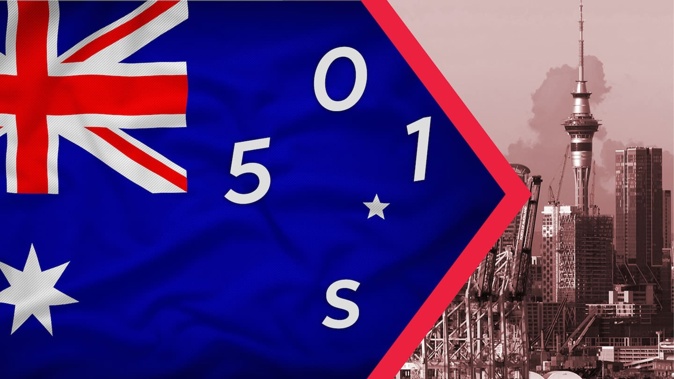
Follow
the podcast on
![]()
The Australian Government is pivoting to a stricter stance on deporting so-called “501s” – people with criminal histories who had mostly grown up in Australia but were born in New Zealand.
The new directive, dubbed Ministerial Direction 110, effective from today, takes a U-turn on previous commitments made by the Australian Government in 2022 to prioritise considering a person’s links to Australia in visa decisions.
Former 501 Mark Talanoa started Road II Redemption, a charitable trust, to help people reintegrate back into society.
He told The Front Page he was sent back to New Zealand seven years ago and was fortunate his girlfriend, now wife, was able to support him.
“I still found it hard to adjust to the sort of landscape of the environment of New Zealand, like how slow it was compared to being in Australia for 14 years and coming back.
The couple decided to relocate to Christchurch so Talanoa didn’t “link up with people who were still involved in that space”.
“I’m originally from East Auckland and I chose to not go back to Auckland because I knew what was there for me. I knew that a lot of people that I knew would be back in those circles. And I’ll just, I guess it’ll be just too tempting for me to fall back into old traps.
“Just gang affiliations, but also just boys that you knew from over in Australia and were part of that lifestyle and it’s just so easy to fall into old traps and do old things.
“That’s why going to Auckland and having that as a place where everyone goes to, it sets our people up for failure. Because they’re going to a place where all they know what they know in Australia, why they got deported. We get sent here with very little. You get a couple of hundred bucks and you get patted on the back and get told to do your best. "
Talanoa said men and women come back, live in a hostel, have no work or food and some end up homeless. He said some services can provide support, but the demand is overwhelming.
“I do believe that we’re just collateral damage and being made as scapegoats... We talk about Anzacs, this brotherhood and mateship, but then treat their brothers and sisters like this.”
University of Otago research showed Australia’s deportation policies have been particularly tough on people with mental illness.
Researchers found that 22% of deportees screened on arrival were referred to specialist mental health and addictions services, indicating the high mental health needs of this group. However, many more people fall through the gaps and the lack of family and community support makes rehabilitation very difficult.
“We don’t even take into account that they are just humans, that a lot of us do come back with mental health issues that are not treated and are undiagnosed... And then you send the person like that without the right support back into the community. It’s a sad reality,” Talanoa said.
Deportees by numbers
Between January 1, 2015 to 31 January 31 this year, 3,128 people were deported from Australia.
While not all of them were 501s, over a third (or 35%) were no older than 19 when they left New Zealand. Just over 200 were no older than 9.
Most arrived in Auckland (2,738), followed by Christchurch (210), Wellington (167), Queenstown (9) and Dunedin (1).
Police data released to The Front Page about this group also show that 1,902 have been convicted or linked to offences after they arrived in New Zealand.
They were linked to 20,118 offences – ranging from violence, sexual, drugs and antisocial to property damage/abuse, traffic, and administrative.
NZ Government concerned over backflip
Prime Minister Christopher Luxon says a hardening of Australia’s stance on deportations is regrettable but he would not go so far as to say it was a broken promise after a shift to a more lenient policy in 2022.
“It’s just not right that people who have no connection to New Zealand are deported to New Zealand.”
He said his opposite, Anthony Albanese, had reassured him the common-sense approach would be retained, but he wasn’t sure if deportations would stay at current levels.
Foreign Affairs Minister Winston Peters’ office told The Front Page he shares the Prime Minister’s concerns over the change.
“However, he notes Australian Prime Minister Anthony Albanese’s assurance to New Zealand of a ‘common sense’ approach to the implementation of Ministerial Direction 110,” Peters’ office said in a statement.
“The minister had a phone call with the Australian Immigration Minister Andrew Giles on 4 June. Mr Giles outlined the broad direction of the intended change. Ministerial Direction 110 was not shared prior to release.”
Australian Immigration Minister Andrew Giles declined The Front Page’s request for an interview.
Instead, his office directed to earlier comments made, that decisions on deporting people who have spent the majority of their lives in Australia should be made based on “common sense” and “the protection of the Australian community”.
Listen to the full episode to hear more about what can be done to help 501s get back on their feet in New Zealand.
The Front Page is a daily news podcast from the New Zealand Herald, available to listen to every weekday from 5am. The podcast is presented by Chelsea Daniels, an Auckland-based journalist with a background in world news and crime/justice reporting who joined NZME in 2016.
You can follow the podcast at iHeartRadio, Apple Podcasts, Spotify, or wherever you get your podcasts.
Take your Radio, Podcasts and Music with you









